 Monday, 01 January 2007
From Ahmed in South Africa:
Bring up the calendar by clicking on the time in the taskbar. Now click on the month (for example December 2006). You will get a year view. Click on the year and you get a ten year view. Click on this and you get a century view.
This is fun!
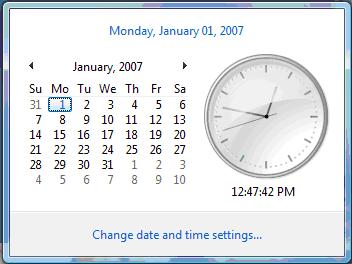 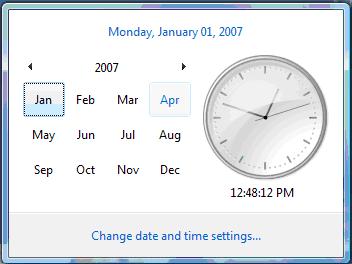 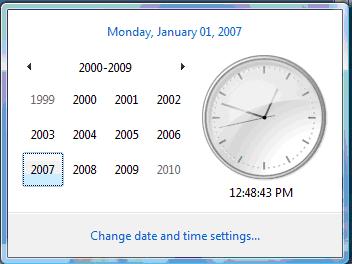 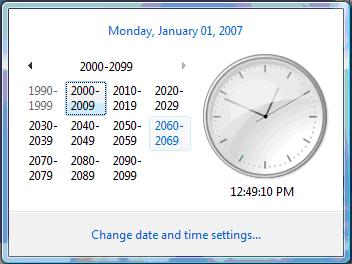
You can drill back down any time -- just click on a cell and work your way back to the month of interest.
Kate
 Thursday, 14 December 2006
Microsoft has announced that the next Professional Developers Conference (PDC) will be October 2-5, 2007 in Los Angeles, with two days of pre-conference on September 30 and October 1. That's good news and bad news for me. I'm glad we're having a PDC this year because it means there's something to announce and something to get early bits of. The official word is:
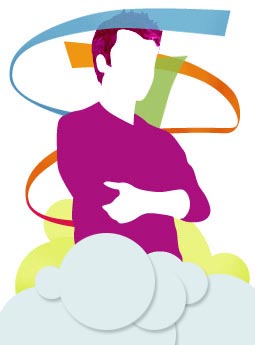 The PDC is the definitive developer event focused on the future of the Microsoft platform. PDC 2007 attendees will have the opportunity to access new code, learn about the latest Microsoft product offerings and hear from Microsoft executives about the various platform developments. The PDC is the definitive developer event focused on the future of the Microsoft platform. PDC 2007 attendees will have the opportunity to access new code, learn about the latest Microsoft product offerings and hear from Microsoft executives about the various platform developments.
Check http://msdn.microsoft.com/events/pdc/ for updates; you can also subscribe to the RSS feed to find out more information about the event as we get closer. Registration will open in the May/June timeframe.
So what's the bad news? LA, again. This will be three in a row. I wouldn't miss the PDC for anything but can't we go somewhere else?
Kate
 Wednesday, 13 December 2006
Yes indeed, there will be a code camp in Toronto next year! It will be held Saturday, March 31st and the website is now ready for you to register as an attendee, a volunteer, or a speaker.
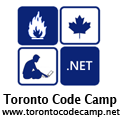 The Second Annual Toronto Code Camp, a free .NET community sponsored event, will be held on March 31st, 2007! Last years event was a huge success with over 220 attendees, 4 tracks, 20 speakers, 25+ volunteers and over $17,000 in prizes given away. This year’s event will be even bigger and better! Registration is now open, but remember, space is limited and based on last years response it will fill up fast. The Second Annual Toronto Code Camp, a free .NET community sponsored event, will be held on March 31st, 2007! Last years event was a huge success with over 220 attendees, 4 tracks, 20 speakers, 25+ volunteers and over $17,000 in prizes given away. This year’s event will be even bigger and better! Registration is now open, but remember, space is limited and based on last years response it will fill up fast.
Deadline for speakers is Jan 15th, for volunteers Feb 15th, and for attendees there is no deadline, but it will "sell out" -- to the extent a free event can sell out. Trust me, you want to be there. If you don't normally attend Microsoft events or user group meetings, either for scheduling reasons or because you don't want to be "sold to" and you worry that might happen at such events, you should make a point of coming to Code Camp -- it's a grassroots community event and a great opportunity to learn from a wide variety of speakers on a wide variety of technologies. And if you can stand the thought of ever speaking some day, Code Camp is the classic place to start. We'll even help you become a speaker if you're interested.
Kate
 Tuesday, 12 December 2006
Gee, ten minute talks on very specific technical topics... where have I heard that concept before? It really is something technical people need. Here are a bunch from MSDN in the UK along with a pretty nice UI to let you filter by technology, content level, even presenter if that's important to you. They seem to upload more about every other month.

I took a quick listen to "Wrapping Windows APIs with C++/CLI" and I liked it.
Kate
 Monday, 11 December 2006
The Regional Director program truly is worldwide -- about half of the 120 or so of us are located outside the USA. So let's say you want some pictures of Microsoft software in beautiful locations around the world, what better group to ask? The program asked us to send in pictures this fall, and here's the result: 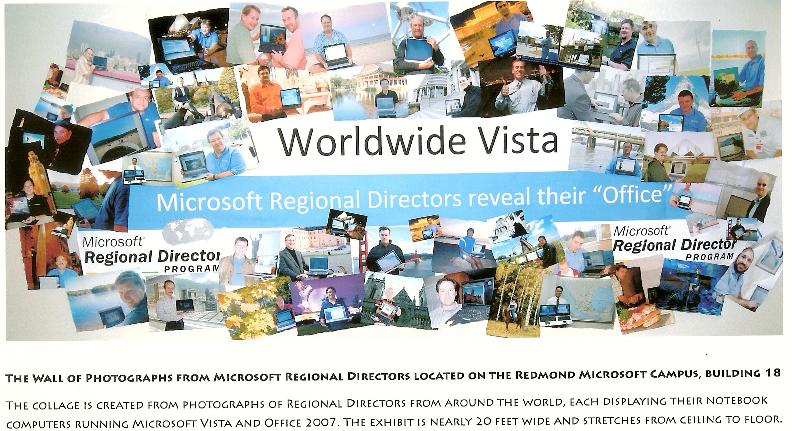
(larger version)
Amazing, aren't we? For my picture, which is nowhere near as spectacular as some, I went and stood among some turning leaves.
Kate
 Sunday, 10 December 2006
The title isn't mine, it's Charles Petzold's, and I would be quite surprised if you didn't learn things about C++/CLI just by learning things about the .NET Framework. In other words, you don't need to plan to switch to C# to get some benefit of this free e-book. It was originally supposed to be a chapter, but ended up over 250 pages long.
I know people still need this material. I have a new mentoring client with an established team of C++ developers who are just looking at moving to the .NET Framework. I came and did a "what is .NET" talk for them, with diagrams like this:
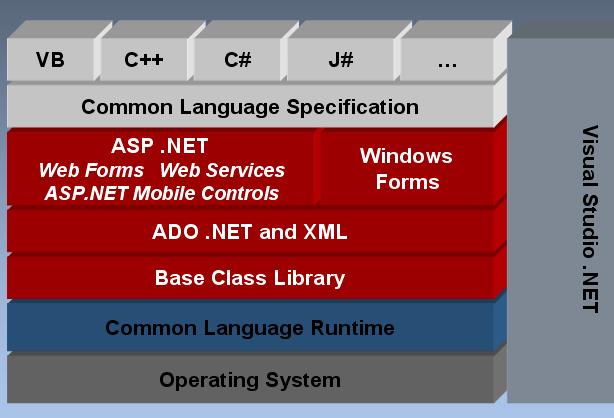 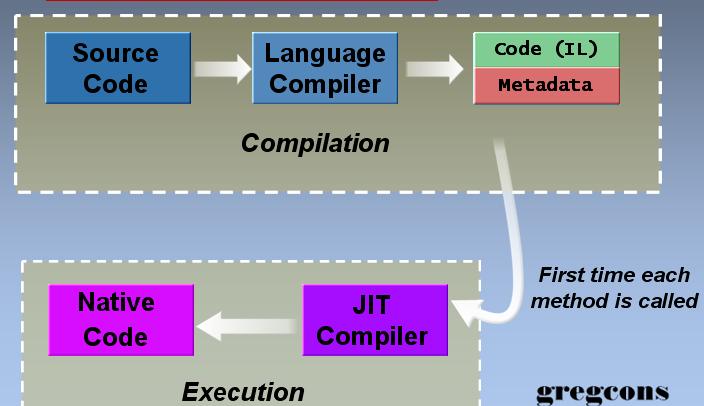
If you already recognize these pictures and realize what they are supposed to illustrate, then you don't need the e-book. But if you haven't really paid much attention to the .NET Framework, then this is a fairly painless way to learn a lot of it. The thing is, it's all C#. My suggestion to you is to bear with that -- a C++ programmer can read C# without too much difficulty -- and then come on back here to see how to do the same things using idioms you already know and love, and how to drop back into native code any time you like for various reasons include control over your application's performance.
Kate
 Saturday, 09 December 2006
I was just looking at some old-style MC++ to convert a sample into C++/CLI. I had to convert this sort of thing: public __gc class PostCodeChecker
{
public:
virtual String* Check(String* code)
{
String* error = S"OK";
return error;
}
Boolean Test(String* code)
{
Boolean ret = false;
String* error = Check(code);
if (error->Equals(S"OK"))
{
ret = true;
}
return ret;
}
};
Into this sort of thing:public ref class PostCodeChecker
{
public:
virtual String^ Check(String^ code)
{
String^ error = "OK";
return error;
}
Boolean Test(String^ code)
{
Boolean ret = false;
String^ error = Check(code);
if (error=="OK")
{
ret = true;
}
return ret;
}
};
This is pretty mechanical work and just the sort of thing you might like to hand off to a tool. The VC++ team has been working on one, but it hasn't been a top priority. Now they've decided to release it as-is to those who might have some use for it, rather than holding onto it until it's perfected:
To set expectations correctly, the tool was going to be a “help” rather than a complete solution and in the push to complete other projects the tool was never fully completed, tested or documented. We are happy to release the tool “as is” as a few initial tests with external users have shown that they received benefits from using the tool even if: 1) it does not provide complete translation between the two different syntaxes and 2) manual modify of the outputted source code is still required to complete the conversion. The tool does come with source code so that users who wish to modify or extend the functionality to better suit their code bases can. The tool is totally unsupported by Microsoft.
If you have some oldstyle Managed C++ to convert, why not see if it can help you? It's a 5 meg download.
Kate
ps: one of the side effects of the more readable nature of C++/CLI is that after the mechanical work was done I just had to do this: Boolean Test(String^ code)
{
return Check(code)=="OK";
}
 Friday, 08 December 2006
Do you read Raymond Chen's blog? You really should. Like so many of the blogs I read these days, it is also going to be available as a book.
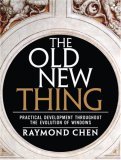
Ryamond says:
Luckily, I found a sympathetic ear from the folks at Addison-Wesley Professional who were willing to take a chance on my unorthodox proposal. But I caved on the length, bringing it up to 500 pages. Actually, I came up with more like 700 pages of stuff, and they cut it back to 500, because 700 pages would take the book into the next price tier, and "There isn't enough of an audience for a book that big!"
Eighteen months later, we have The Old New Thing: Practical Development Throughout the Evolution of Windows, following in what appears to be the current fad of giving your book a title of the form Catchy Phrase: Longer Explanation of What the Catchy Phrase Means.
It's a selection of entries from this blog, loosely organized, and with new material sprinkled in. There are also new chapters that go in depth into parts of Win32 you use every day but may not fully understand (the dialog manager, window messages), plus a chapter dedicated to Taxes. (For some reason, the Table of Contents on the book web site is incomplete.)
Oh, and those 200 pages that got cut? They'll be made available for download as "bonus chapters". (The bonus chapters aren't up yet, so don't all rush over there looking for them.)
This is a kind of trend really - many writers have put energies into blog posts instead of books, only to look up and discover that some of the posts, rearranged into an approrpriate order and with a little writing to connect them, make a pretty cool book. It's not clear whether it will be out in time to ask for it as a Christmas present, but it would be a cool way to use any booky gift certificates people give you.
Kate
© Copyright 2026 Kate Gregory
Theme design by Bryan Bell
newtelligence dasBlog 2.3.9074.18820   | Page rendered at Saturday, 21 February 2026 04:58:03 (Eastern Standard Time, UTC-05:00)
|
On this page....
Pluralsight Free Trial
Search
Navigation
Categories
Blogroll
Sign In
|